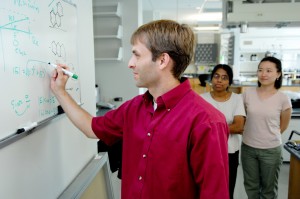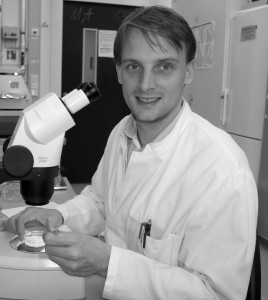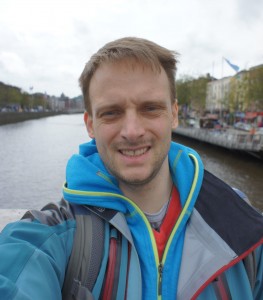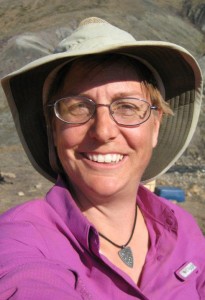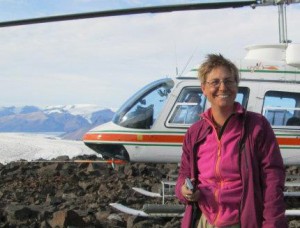Science For Six-Year-Olds (SFSYO for this school year) is a recurring segment on Science Decoded for Mrs. Podolak’s first grade class at Lincoln-Hubbard elementary school. This year the posts are inspired by #iamscience (also a Tumblr) and #realwomenofscience two hashtags on twitter that drove home for me the importance of teaching people who scientists are and what they really do.
Hello first graders! I’m so excited to introduce you to our March scientist of the month Dr. Michael Dickey. Michael is a chemical engineer at North Carolina State University. Like I did with our other scientists, Penny, Philipp, Anne-Marike, Pete and Becky, I asked Michael some questions to find out more about what he does. I hope you will enjoy learning more about him and his job. Below you can read our interview, and if you’d like to ask him any questions, be sure to leave them in the comments!
Erin: What kind of scientist are you?
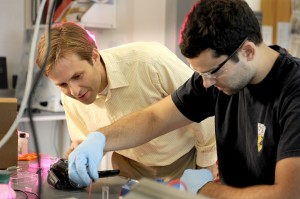 Michael: I’m a chemical engineer. To understand the importance of chemical engineers, just consider your day-to-day life or look around you. The electronics you play with, the paper your books are written on, the paint on your walls, the plastics and fabrics in your car, much of the food you eat….these are all made or improved upon by chemical engineers. In general, chemical engineers take materials and substances and turn them into things that are valuable. In the past, a common example might be digging oil out of the ground and then separating and processing the chemicals in the oil to turn them into things like gasoline, fuel, chemicals, and plastics. These days, chemical engineering is much more diverse and chemical engineers work on many different problems from biology, the environment, clean energy, and nanotechnology, just to give a few examples.
Michael: I’m a chemical engineer. To understand the importance of chemical engineers, just consider your day-to-day life or look around you. The electronics you play with, the paper your books are written on, the paint on your walls, the plastics and fabrics in your car, much of the food you eat….these are all made or improved upon by chemical engineers. In general, chemical engineers take materials and substances and turn them into things that are valuable. In the past, a common example might be digging oil out of the ground and then separating and processing the chemicals in the oil to turn them into things like gasoline, fuel, chemicals, and plastics. These days, chemical engineering is much more diverse and chemical engineers work on many different problems from biology, the environment, clean energy, and nanotechnology, just to give a few examples.
Erin: Where did you go to school, and what did you study?
Michael: I grew up in North Carolina and went to school there until college. I went to Georgia Tech for undergraduate, Texas for graduate school, and did a post-doc at Harvard. All of my degrees are in chemical engineering.
Erin: Where do you work, and what does a typical day at work entail?
Michael: I work at North Carolina State University as a professor. The job is fun, but incredibly demanding. I usually tell people it is like doing 2-3 jobs at a time. Teaching is a part of my job, but the thing that takes the most time is running a research group and mentoring students. The job involves raising money to support the students and to buy equipment and supplies, managing the research money, and mentoring students. I don’t often get to work in the lab, but I enjoy talking about science with my graduate students. A typical day for me involves a lot of meetings with colleagues and students. I also spend a lot of time on my computer replying to emails, reading, and writing.
Erin: Why did you decide to become a scientist?
Michael: I always liked math and science, it it was something I wanted to do for a long time. It probably became more clear to me in high school that those were my best subjects in school.
Erin: What is your favorite thing about your job?
Michael: I like the freedom of the job, the fact every day is different, the intellectual satisfaction, and the ability to work with (and help) young people.
Erin: What is something about your job that would surprise us?
Michael: There is a misconception about professors. Most people think it is an easy job, but most of my colleagues work all of the time because the job is so demanding. I “only” teach one class each semester, but the teaching represents a very small portion of my job responsibilities.
Erin: What are some of the things you like to do for fun?
Michael: I have two daughters that are two and four years old. They are so much fun to play with. I also love going to basketball and football games. I enjoy playing guitar and exercising, although it is often hard to find time to do either these days. I also like movies and reading, but again, I don’t have much time these days to do those things!
What do you think first graders? I think it is pretty interesting that a lot of scientists are also professors, and work at universities or colleges like Michael does. Do you have any questions for him about being a chemical engineer and a professor? Let him know in the comments.
For more information check out these awesome videos showcasing some of the research from Michael’s lab:
Self-Healing Stretchable Wires
Ultra Stretchable Wires
3-D Objects, Just Add Light
Thank you Michael for being our March Scientist of the Month!
